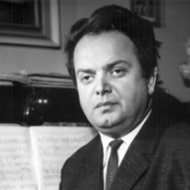Soukup Vladimír
- Year of Birth - Death :
- 1930 - 2012
Biography
It is difficult to put Vladimir Soukup in one of usual categories of artistic types; statement that he was a sort of versatile, universal composer is more fitting. He started to study composition privately with Zdeněk Hůla, in 1955 he completed his professional education at the Prague Academy of Performing Arts as pupil of Jaroslav Řídký. Since then he has devoted himself to composition professionally. Instrumental music, both chamber and orchestral, has been undoubtedly in the centre of his creative interest. At the beginning of his career as composer Vladimír Soukup decided to write sonata compositions for various solo instruments as one of his long-term tasks. He has never abandoned that intention: his instrumental concertos and sonatas form a long series of compositions, reflecting all typical features of his compositional work and style. It is obvious that he considered the sonata form as a living and inspiring incentive for the development of creative phantasy. It enables him, to write music of contrasting moods, dramatic development and virtuoso nature - music expressing his attitude to the contemporary rhytm and style. His compositions for solo instrument, though not written for specific performers (with the expection of the Trombone concerto dedicated to Professor Hejda, a member of the Czech; Philharmonic Orchestra), are easy to play in spite of all the difficulty of their parts, becouse he grasped specific features of instrumental techniques. Therefore they are popular among performers. Four symphonies and several ensemble chamber works complement the outline of Soukup's efforts.
In the seventies there appears a new dominant in Soukup's creation, concurrent with his incessant activity in the instrumental field: it is his interest in musical stage, namely ballet, opera, and musical play. Vladimír Soukup inherited love for the theatre from his parents, who were passionate amateurs and the theatre stage quite naturally accompanied his first steps as composer in his childhood. However, he entered himself the professional scene in the sphere of serious music much later: it was in 1960 with the feature ballet Francois Villon, which was presented with success in Ostrava (40-times) and Ceske Budějovice (35-times). After lapse of years there followed musical "The Sun above the River", a chamber satiric of treatment of swindlers and their victims (60x in the Prague - Karlín Music Theatre), another musical entitled "The Green Valley" from contemporary village and two operas: Cleopatra (to a Shakespearean theme) and chamber opera buffa "Sussy in Bath", a contemporary satire introduced successfully in Opava in 1980. Soukup composed his third opera for the centenary of the National Theatre; it is called "Rebellion" and its action is situated in the 18th century, in the period of a large peasant uprising. His ballet "Little Beetles" was composed on his own libretto, but vaguely linked with the well-known book for children by Jan Karafiát. Musical-dramatic works determined the nature of the ripest period of Soukup's compositional output. As a preparation for it served Soukup's cantatas and cycles of songs as well as choirs of 1956-1974, with two exceptions, all of them are settings of texts by Czech poets. In his music Vladimír Soukup strives for comprehensible, technically perfect shape. He wanted to attract contemporary listener not by sound effects or technical experiment, but by convincing emotional confession. He had found his stimuli in the works by classics of the 20th century - Prokofyev, Martinů, Honegger, Bartók. The presence of the melodic element is indispensable to him, as is the presentation of distinct rhythm.
© 2012-2025 Musicbase.cz
Webdesign & hosting Nux Ltd.
Information about web | Sitemap | RSS | Statistics | CMS
Contact information
Music information center, o.p.s.
tel: 257 312 422 | e-mail: his@musica.cz

